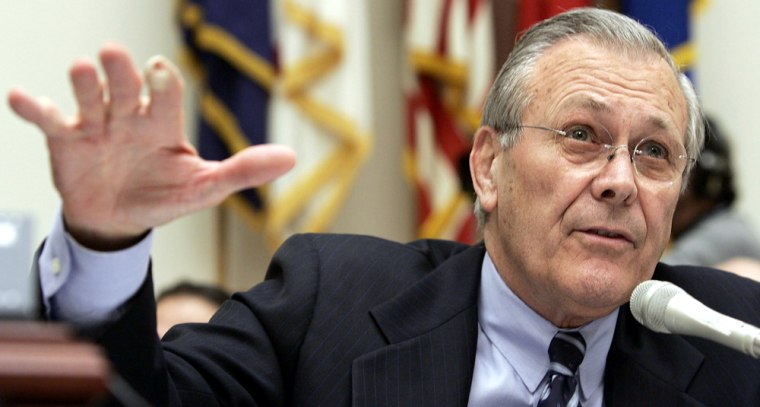Al-Qaida’s remaining leaders are intent on striking again inside the United States, the nation’s military and intelligence leaders told lawmakers Wednesday in a coordinated plea for more support for the war on terrorism. But members of Congress said the intelligence community needed to get its own act together before telling them what to do.
In his first public appearance as head of the CIA, Porter Goss warned that while the U.S. wars in Afghanistan and Iraq had left al-Qaida battered, they had also given birth to a younger generation of battle-hardened terrorist leaders plugged into a “potential pool of contacts” from which to build new international terrorist groups.
“Those jihadists who survive will leave Iraq experienced in and focused on acts of urban terrorism,” Goss said in an unusually blunt statement before the mostly secretive Senate Intelligence Committee.
In particular, he said, al-Qaida was working to obtain a nuclear weapon, a possibility that was very real in light of the amount of material known to missing from the stockpiles of the former Soviet Union and the nuclear black market run by a disgraced Pakistani scientist, A.Q. Khan.
“There is sufficient material unaccounted for so that it would be possible for those with know-how to construct a nuclear weapon,” Goss said, calling “potential Khans” a particularly worrisome threat.
Rumsfeld, Mueller echo the alarm
Testifying before the House Armed Services Committee, Defense Secretary Donald Rumsfeld sounded a similar alarm as he argued for President Bush’s request for $419 billion in defense spending for fiscal 2006.
“The extremists continue to plot to attack again,” he said. “They are, at this moment, recalibrating and reorganizing. And so are we.”
FBI Director Robert Mueller, meanwhile, raised the specter of a true sleeper operative who he contended had been in place for years to launch an attack inside the United States. “I remain very concerned about what we are not seeing,” he said.
Mueller revealed that agents are working to stop an underground movement to radicalize inmates in prisons, which he called fertile ground for extremists to exploit inmates who had converted to Islam.
Rumsfeld’s comments came at a budget hearing for the Defense Department. Mueller, Goss and other intelligence leaders spoke at the annual briefing on threats from around the globe.
Intelligence agencies in the cross hairs
In the past year, the intelligence community has been faced with a series of negative reports, including the work of the commission that investigated the Sept. 11, 2001, attacks and the Senate Intelligence Committee’s inquiry on flawed intelligence on Iraq.
Lawmakers, including Republican leaders of intelligence- and defense-related committees, said Wednesday that they would no longer take the administration’s word on the terrorist treat and would push to ask more questions before conclusions could be announced.
Pat Roberts, R-Kan., chairman of the Senate Intelligence Committee, complained about conflicting and inconclusive reports from government agencies as recently as last summer.
“We decided, well, we just didn’t have a consensus. Now, damn, that’s got to quit,” said Roberts, who added, “We cannot and should not always take the intelligence community’s assessments at face value.”
At another point, Roberts asked, “You know, one of my questions is, do you people know each other?”
Bolstering lawmakers’ annoyance was the absence Wednesday of a new national intelligence director eight weeks after the position was created in last year’s intelligence reorganization bill. Democrats accused the administration of not sharing their urgency.
“There should be another chair before us, with an accompanying name card that reads ‘director of national intelligence,’” said Sen. John D. Rockefeller IV of West Virginia, the intelligence panel’s ranking Democrat.
No rubber stamp for Bush
The criticism indicated that the Republican-controlled Congress could exercise its considerable authority over federal spending and reject White House requests to simply sign the checks.
House Majority Leader Tom DeLay, R-Texas, and Rep. Jerry Lewis, R-Calif., the new chairman of the House Appropriations Committee, said lawmakers were questioning billions of dollars in foreign aid and State Department spending that Bush requested in an emergency bill this week. DeLay said some of Bush’s foreign aid proposals “probably do not qualify” for the expedited treatment he was seeking.
Even Rumsfeld joined in the criticism, saying Wednesday that intelligence agencies failed to provide reliable estimates of the size of Iraq’s insurgency.
Rumsfeld declined to answer lawmakers who asked him to assess how many insurgents were fighting the 150,000 U.S. troops in Iraq.
“My job in the government is not to be the principal intelligence officer and try to rationalize differences between Iraqis, the CIA and the DIA [the Defense Intelligence Agency],” he replied. “I see these reports. Frankly, I don’t have a lot of confidence in any of them, on that number.”
Rumsfeld was to return Thursday for more appearances on Capitol Hill, where lawmakers were expected to sharply question him and other military leaders, including the Defense Department’s comptroller, on the 2006 defense budget.
For Goss, the former chairman of the House Intelligence Committee, the hearing Wednesday was his first public appearance as director of the CIA since hearings in September for his confirmation.
Critics say he is politicizing the agency by surrounding himself with Republican advisers from his years in Congress. Yet his allies say he is promoting agency veterans to senior management positions and making changes essential to ensure that the intelligence community does not repeat the kind of blunders that led up to the 2001 attacks and the faulty prewar estimates of Iraq’s weapons.
